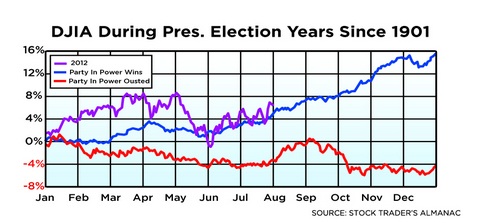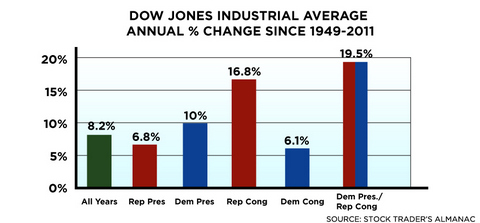If you want to know who's going to win Election 2012, just ask Mr. Market. He has a knack for picking presidential winners.
As it happens, stock market performance in the years and months leading up to a presidential election is one of the most reliable indicators of who will win and who will lose.
And the way things look at the moment, Mr. Market really likes the President Barack Obama reelection odds.

"It's suggesting that Obama's got a better chance than people think," Jeff Hirsch of Stock Trader's Almanac told Yahoo's Breakout last week. "Incumbent victories are accompanied by much larger gains in the stock market. The Dow Jones has been up significantly higher in election years when incumbents win. And it looks like the track that we're on here."
Hirsch's data shows that since 1901, election years in which the incumbent wins enjoy a Dow Jones Industrial Average rise of 6% by August and 12% by Election Day.
So far this year, the Dow is up nearly 8.5% -- comfortably in re-election territory for President Obama.
Markets Raise Obama Re-Election Odds
Hirsch isn't the only one studying the relationship between Mr. Market and the elections.
Earlier this year the Socionomics Institute of Atlanta did a study that showed the Dow's performance in the three years leading up to a presidential election predicted the winner more accurately than such economic indicators as GDP, unemployment and inflation.
The Socionomics Institute study found that a Dow gain of 20% or more over that three-year period almost guaranteed victory for the incumbent. A drop of 10% or more resulted in a one-term president.
The Dow is up 35% since Nov. 1, 2009 (the Institute uses Nov. 1 because it closely coincides with the November elections). That's about the same increase as under President Bill Clinton - the last Democratic president to win re-election.
The Socionomics Institute also tested one-year, two-year and four-year periods.
"Right now on all four of those periods the stock market is positive," Robert Prechter, president of Elliott Wave International and a co-author of the study, told Yahoo's Breakout in June. "So the odds would be that Obama, if the election were held today, would be re-elected. But it's a long time to the election."
Prechter also has a theory about why the stock market is such a good predictor of presidential elections.
"Social mood is behind both of these," Prechter explained. "It changes people's perception of how the president is doing and it also changes traders' decisions about whether to buy and sell. So we're not surprised at all that those are in very close lock-step."
Mr. Market's ability to predict elections also works with shorter time periods.
Stan Stovall, chief investment strategist for Standard & Poor's Equity Research Services, has found that market performance in the third quarter of an election year is a pretty strong indicator of a presidential incumbent's fate.
"Since 1900 whenever the market rose in the August, September and October time frame ... the incumbent has been re-elected 80% of the time," Stovall told Yahoo's Breakout earlier this month. "Whenever the market has fallen from July 31st through October 31st, the incumbent has been replaced 88% of the time."
Since July 31, the Dow is up 1.3% and the Standard & Poor's 500 is up 2.1% -- still good for President Obama's reelection odds, but vulnerable to a sudden reversal.
Mr. Market's Political Preferences
Just as the market can predict election outcomes, election results can predict market performance.
For one thing, investors prefer incumbent presidents.
"The important thing is that we have an incumbent running for re-election, and that's been good for the market overall," said Hirsch, adding that since 1901 the Dow has gained an average of 9% in such years.
Mr. Market also has preferences regarding Republicans and Democrats, as well as party control of the branches of government.
"Everybody thinks a Republican president has been better for the stock market," Hirsch said. "Actually it's Republican Congresses that have presided over the greatest market gains."
Republican Congresses have enjoyed average gains of 16.8%, compared to just 6.1% for Democratic Congresses.
 Perhaps more surprising is Mr. Market's affinity for divided government.
Perhaps more surprising is Mr. Market's affinity for divided government.
"Combine in a Democratic president [with a Republican Congress] and you get a 19.5% average gain," Hirsch said. "The bar just shoots up. That's the combo that's been best for the market."
However, Mr. Market doesn't like Congress itself split between the two parties as it is now with a Republican House and Democratic Senate.
"Since 1900 whenever we had a totally unified [Congress] the return in the stock market has been more than twice that of whenever we have had a split Congress," Stovall said.
It turns out Mr. Market has more to say about our elected officials than most people would think.
"Wall Street typically worries about how politics might affect the stock market; perhaps presidential candidates should worry about how the stock market might affect their political outcome," noted Cathy Hetrick, a senior portfolio adviser at InvestTech.
Related Articles and News:
- Money Morning:
Election 2012: A Candidate With Economic Heft, Paul Ryan is No Sarah Palin - Money Morning:
What Investors Love About the Romney Tax Plan - Money Morning:
Election 2012: President Obama at the Mercy of U.S. Economy - US News & World Report:
Stock Market Picks 90 Percent of Presidential Elections - Reuters:
Analysis: Obama presidency great for stocks. Will it help him?
About the Author
David Zeiler, Associate Editor for Money Morning at Money Map Press, has been a journalist for more than 35 years, including 18 spent at The Baltimore Sun. He has worked as a writer, editor, and page designer at different times in his career. He's interviewed a number of well-known personalities - ranging from punk rock icon Joey Ramone to Apple Inc. co-founder Steve Wozniak.
Over the course of his journalistic career, Dave has covered many diverse subjects. Since arriving at Money Morning in 2011, he has focused primarily on technology. He's an expert on both Apple and cryptocurrencies. He started writing about Apple for The Sun in the mid-1990s, and had an Apple blog on The Sun's web site from 2007-2009. Dave's been writing about Bitcoin since 2011 - long before most people had even heard of it. He even mined it for a short time.
Dave has a BA in English and Mass Communications from Loyola University Maryland.



